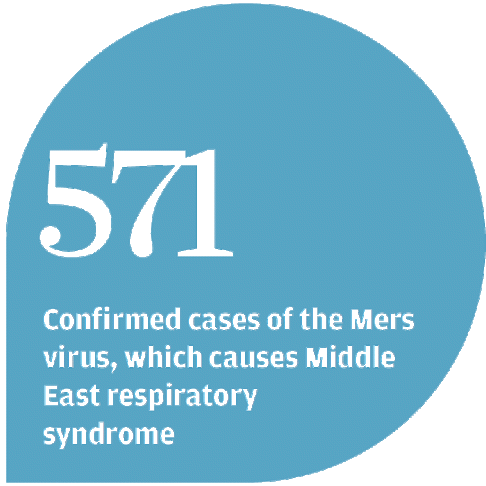
Mers on the rise, but WHO not yet declaring a global health emergency
Scientists say there is still no evidence the disease transmits from person to person
Despite a rapid increase in cases of a deadly viral infection that emerged in the Middle East two years ago, the World Health Organisation said the Mers outbreak was not yet a global health emergency.

But because "there is not convincing evidence" that the disease has become more transmissible from person to person, the experts said, it does not yet meet the criteria for being declared a public health emergency of international concern, according to WHO spokesman Keiji Fukuda.
The emergency committee found that much of the recent surge in cases was from large outbreaks of Mers in hospitals in Saudi Arabia, where some emergency rooms were overcrowded and infection control was "sub-optimal".
The WHO group called for all hospitals to immediately strengthen infection prevention and control measures. Basic measures, such as washing hands and proper use of gloves and masks, would have an immediate impact on reducing the number of cases, Fukuda said.
The virus, which causes Middle East respiratory syndrome, or Mers, infections in people, has been confirmed in 571 cases reported to the WHO, including 171 deaths.
There are two confirmed cases in the United States. One patient in Indiana has recovered. The second patient is in hospital in Orlando, Florida. Two hospital employees who were exposed to the Florida patient have developed flu-like symptoms, and one has been admitted to hospital.
Hospital officials said the two staff with symptoms had tested negative for the virus. They are awaiting test results on 18 other health care workers. Meanwhile, the patient with Mers remains in isolation but no longer has a fever.
Mers, which was first reported in Saudi Arabia in 2012, can cause severe acute respiratory illness with fever, cough and shortness of breath. More than 30 percent of known patients who have symptoms of Mers have died. The virus is from the same family as Sars, or severe acute respiratory syndrome, which killed almost 800 people worldwide after it first appeared in southern China in 2002.
In response to repeated questions about why the committee declined to declare a global health emergency, Fukuda said: "Calling for a global emergency is a major act. … It means you will raise anxieties. You have to have really solid information to say this is a global emergency."
Last week, the WHO declared the spread of polio to several countries to be a global health emergency, only the second time that the WHO has made such an announcement since it adopted rules allowing such designations in 2007.
Fukuda said the two diseases "present two different kinds of dilemmas for the world". The spread of polio is an international public health emergency that could grow in the next few months because of the nearly three-decade effort to eradicate the crippling disease.
"We are not in the middle of eradication of Mers," Fukuda said. The appearance of the virus is more like some other viruses that have arisen over the past decade. Some, like the H7N9 bird flu virus, have the potential to cause a global outbreak because influenza viruses constantly change and could spread easily. But others have "receded into the background", he said. For Mers, experts do not know yet "which direction [it is] going to go in".
